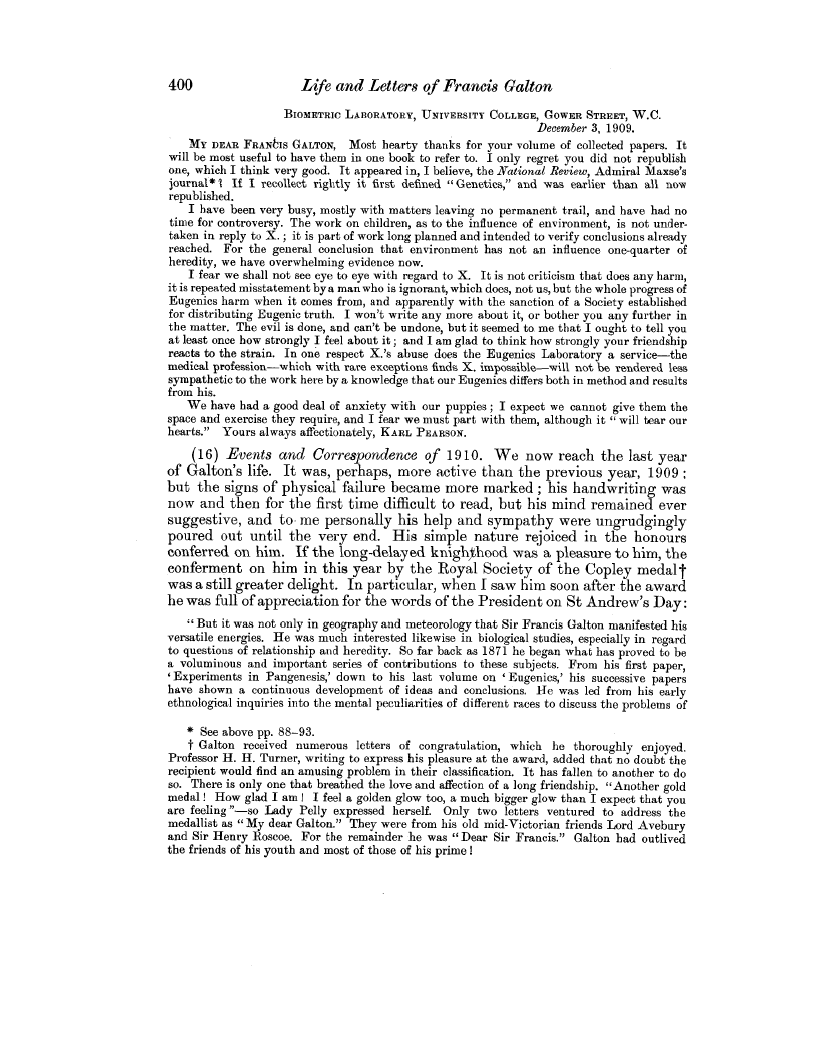| ||||||

OCR Rendition - approximate
400 Life and Letters of Francis Galton BIoMETRIc LABORATORY, UNIVERSITY COLLEGE, GOWER STREET, W.C. December 3, 1909. MY DEAR FRANbis GALTON, Most hearty thanks for your volume of collected papers. It will be most useful to have them in one book to refer to. I only regret you did not republish one, which I think very good. It appeared in, I believe, the National Review, Admiral Maxse's journal* 1 If I recollect rightly it first defined "Genetics," and was earlier than all now republished. I have been very busy, mostly with matters leaving no permanent trail, and have had no time for controversy. The work on children, as to the influence of environment, is not undertaken in reply to X. ; it is part of work long planned and intended to verify conclusions already reached. For the general conclusion that environment has not an influence one-quarter of heredity, we have overwhelming evidence now. I fear we shall not see eye to eye with regard to X. It is not criticism that does any harm, it is repeated misstatement by a man who is ignorant, which does, not us, but the whole progress of Eugenics harm when it comes from, and apparently with the sanction of a Society established for distributing Eugenic truth. I won't write any more about it, or bother you any further in the matter. The evil is done, and can't be undone, but it seemed to. me that I ought to tell you at least once how strongly I feel about it; and I am glad to think how strongly your friendship reacts to the strain. In one respect X.'s abuse does the Eugenics Laboratory a service-the medical profession-which with rare exceptions finds X. impossible-will not be rendered less sympathetic to the work here by a knowledge that our Eugenics differs both in method and results from his. We have bad a good deal of anxiety with our puppies ; I expect we cannot give them the space and exercise they require, and I fear we must part with them, although it " will tear our hearts." Yours always affectionately, KARL PEARSON. (16) Events and Correspondence of 1910. We now reach the last year of Galton's life. It was, perhaps, more active than the previous year, 1909 ; but the signs of physical failure became more marked ; his handwriting was now and then for the first time difficult to read, but his mind remained ever suggestive, and to- me personally his help and sympathy were ungrudgingly poured out until the very end. His simple nature rejoiced in the honours conferred on him. If the long-delayed knighthood was a pleasure to him, the conferment on him in this year by the Royal Society of the Copley medal t was a still greater delight. In particular, when I saw him soon after the award he was full of appreciation for the words of the President on St Andrew's Day: But it was not only in geography and meteorology that Sir Francis Galton manifested his versatile energies. He was much interested likewise in biological studies, especially in regard to questions of relationship and heredity. So far back as 1871 he began what has proved to be a voluminous and important series of contributions to these subjects. From his first paper, ' Experiments in Pangenesis,' down to his last volume on ' Eugenics,' his successive papers have shown a continuous development of ideas and conclusions. He was led from his early ethnological inquiries into the mental peculiarities of different races to discuss the problems of * See above pp. 88-93. t Galton received numerous letters of congratulation, which he thoroughly enjoyed. Professor H. H. Turner, writing to express his pleasure at the award, added that no doubt the recipient would find an amusing problem in their classification. It has fallen to another to do so. There is only one that breathed the love and affection of a long friendship. "Another gold medal ! How glad I am ! I feel a golden glow too, a much bigger glow than I expect that you are feeling "-so Lady Pelly expressed herself. Only two letters ventured to address the medallist as "My dear Galton." They were from his old mid-Victorian friends Lord Avebury and Sir Henry Roscoe. For the remainder he was "Dear Sir Francis." Galton had outlived the friends of his youth and most of those of his prime !
|